
Patient Scheduling
6 min read
5 Best Patient Scheduling Software in 2026
Summary
Your Competitors Are Embracing AI – Are You Falling Behind?
Efficient scheduling is essential for any healthcare practice to ensure smooth patient flow and minimize administrative burden.
The best patient scheduling software helps clinics and hospitals reduce missed appointments, simplify booking, and streamline overall operations.
Choosing the right platform can improve patient satisfaction and office productivity.
This makes it a critical decision for medical teams.
With many options available, it’s important to identify software that fits both your current needs and future growth.
In this article, readers will find a clear overview of top-rated patient scheduling solutions, along with key features to help make the best choice.
Best Patient Scheduling Software For 2026: Comparison & Ratings Chart
5 Best Healthcare Scheduling Software
Leading healthcare scheduling software options help organizations streamline appointment management, improve patient satisfaction, and reduce administrative workload.
Below are the top choices for 2026, based on user feedback and essential features:
1. Solutionreach
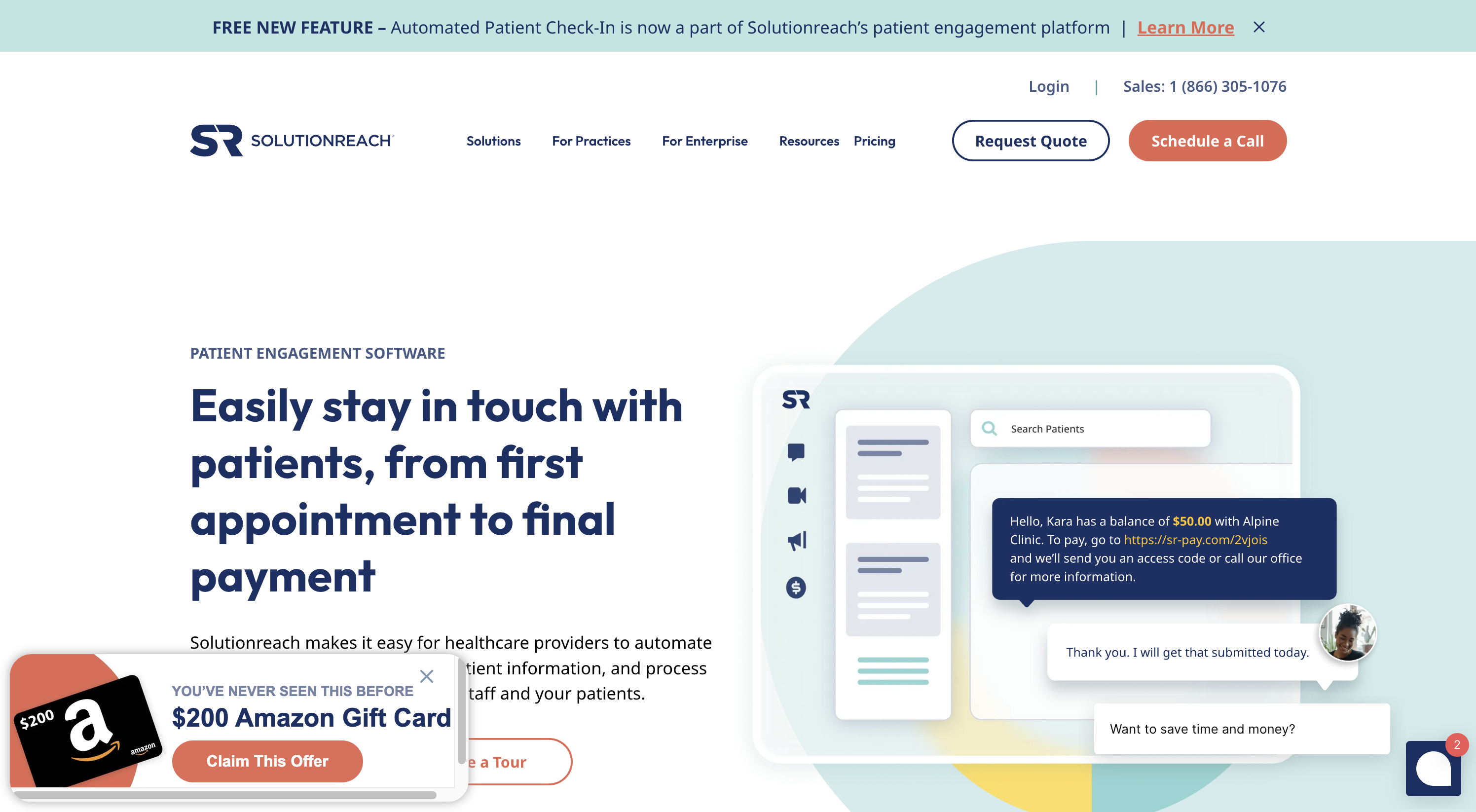
Solutionreach is designed to improve patient engagement through modern communication tools and flexible scheduling options.
Its platform allows practices to stay connected with patients across channels, making it easier to reduce no-shows and keep patients informed while streamlining administrative tasks.
Top Features:
- Two-way texting
- Telehealth support
- Automated appointment reminders
Pros:
- Strong patient communication features
- Seamless CRM and EHR integrations
- High ease of use and adoption
Cons:
- Pricing not publicly transparent
- Interface can feel dated in some areas
Integrations:
Solutionreach integrates with leading EHRs and CRM platforms, making it a versatile option for practices that prioritize patient outreach.
Support:
Support is provided via live chat, email, and a comprehensive resource hub.
Reviews:
G2 rating 4.3/5 (167 reviews), with users praising its communication tools and patient engagement capabilities.
Pricing:
Quote-based—Solutionreach lists Essentials, Plus, and Enterprise packages but requires a custom quote.
2. NextGen
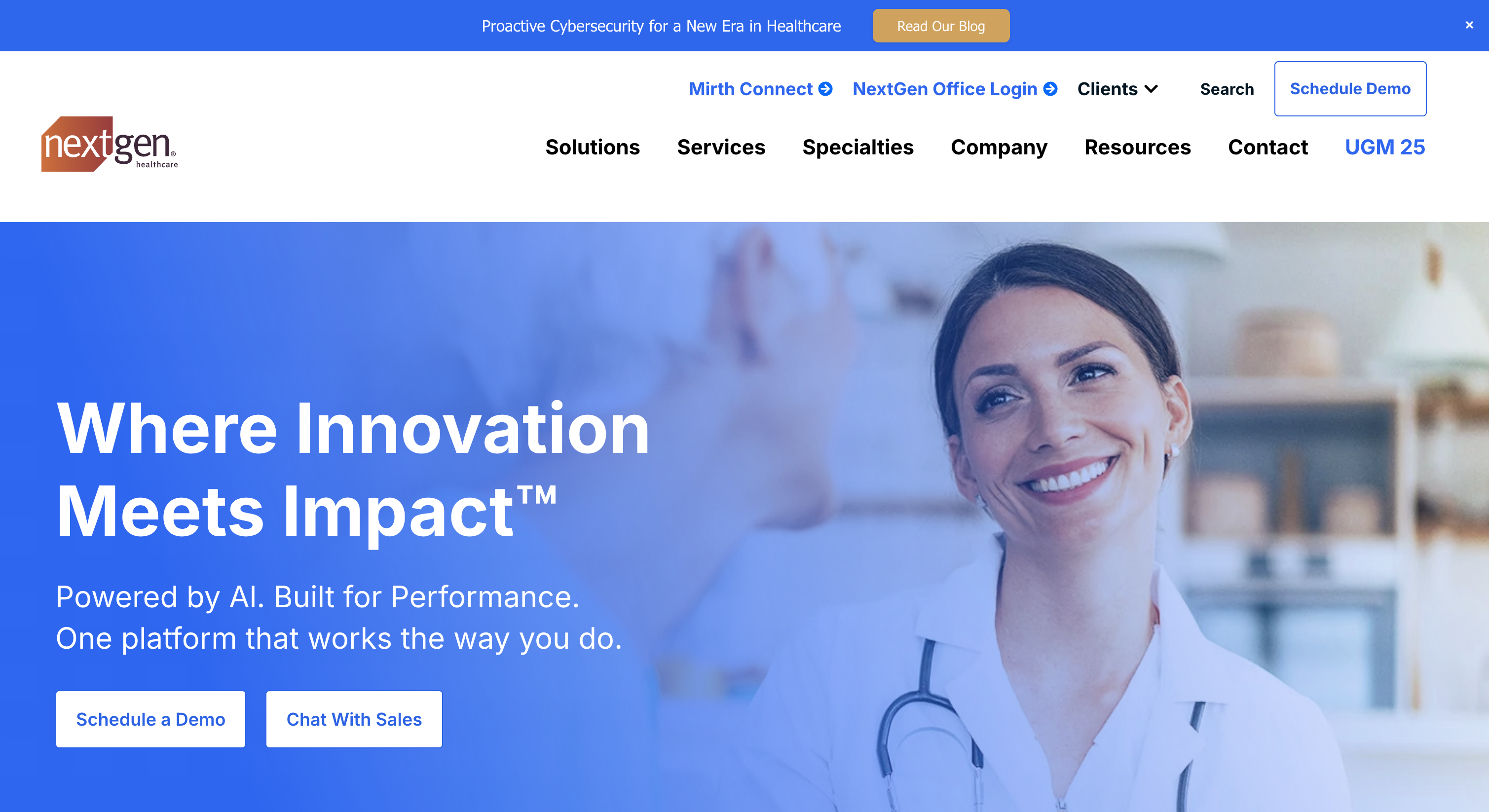
NextGen provides a robust platform aimed at larger practices and multi-location groups, offering advanced scheduling, billing, and patient management capabilities.
It is well-suited for organizations that require strong scalability, compliance features, and seamless integration with existing medical systems.
Top Features:
- Patient online portal
- Multi-location scheduling support
- Billing system integration
Pros:
- Excellent scalability for growing practices
- Robust compliance and reporting features
- Strong interoperability with EHR systems
Cons:
- Steeper learning curve than some competitors
- Interface may feel overwhelming for smaller teams
Integrations:
NextGen integrates tightly with EHR and billing systems, ensuring smooth operations for medium to large organizations.
Support:
Support includes phone, email, and a dedicated client portal.
Reviews:
G2 rating 4.6/5 for NextGen Practice Management, with users highlighting its scalability and enterprise-level reliability.
Pricing:
Custom pricing available upon request, tailored to organization size and needs.
3. Athenahealth
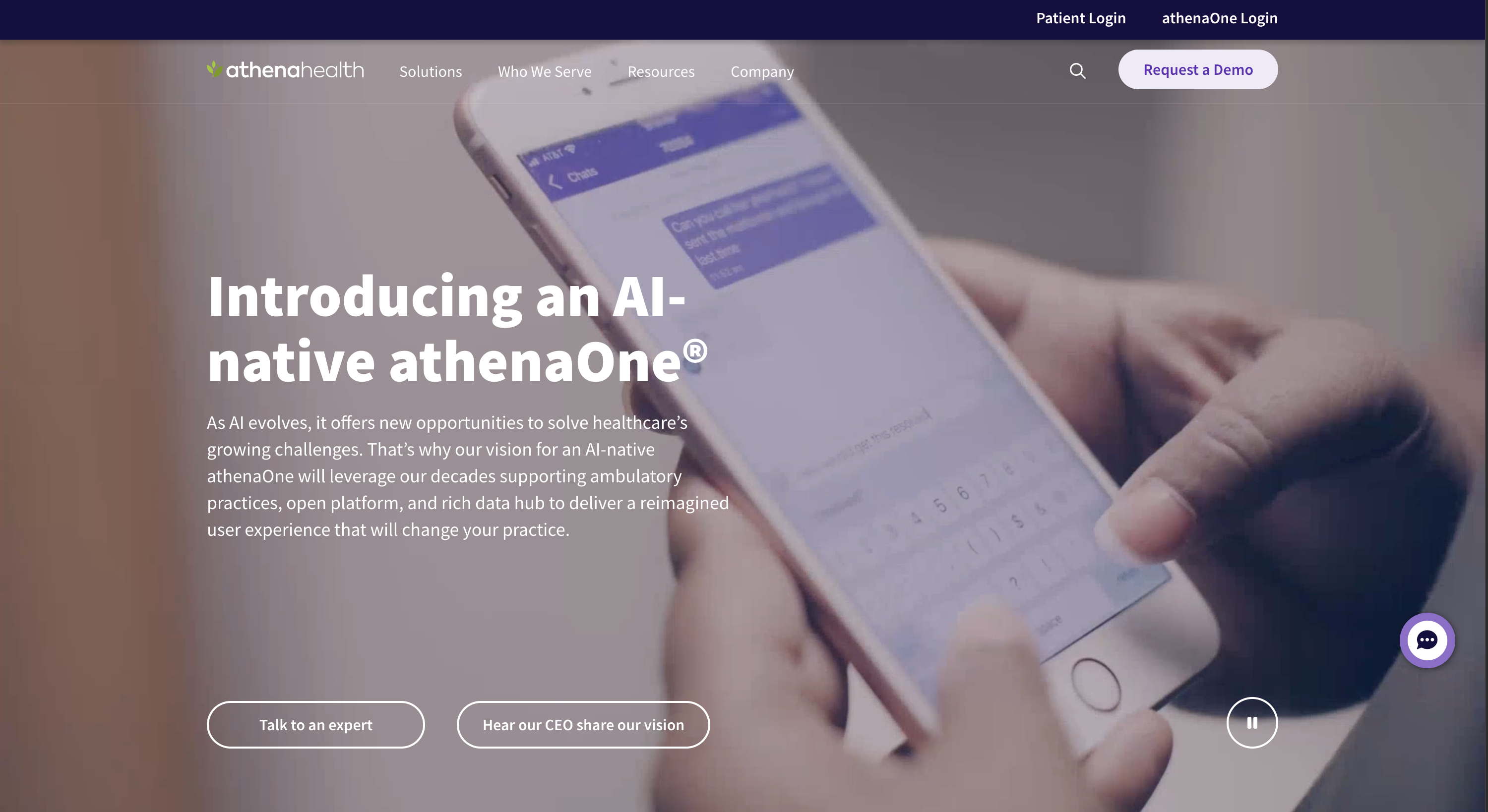
Athenahealth offers an all-in-one platform that emphasizes automation, analytics, and telehealth, making it a strong choice for practices seeking data-driven improvements. With a focus on reducing manual work and providing actionable insights, it helps providers optimize scheduling while improving patient outcomes.
Top Features:
- Automated patient reminders
- Telehealth integration
- Analytics and performance reporting
Pros:
- Strong analytics for data-driven practices
- Reliable telehealth options
- Wide network of EHR integrations
Cons:
- Limited integration depth with some third-party systems
- Support response times vary depending on plan
Integrations:
Athenahealth integrates primarily with its own EHR and has partial compatibility with outside platforms.
Support:
Support is available via phone, chat, and an extensive knowledge base.
Reviews:
G2 rating 3.4/5 for athenaOne, with reviews emphasizing its automation and reporting tools.
Pricing:
Operates on a percentage-of-collections model (revenue share), with costs varying by specialty and practice size.
4. Kareo
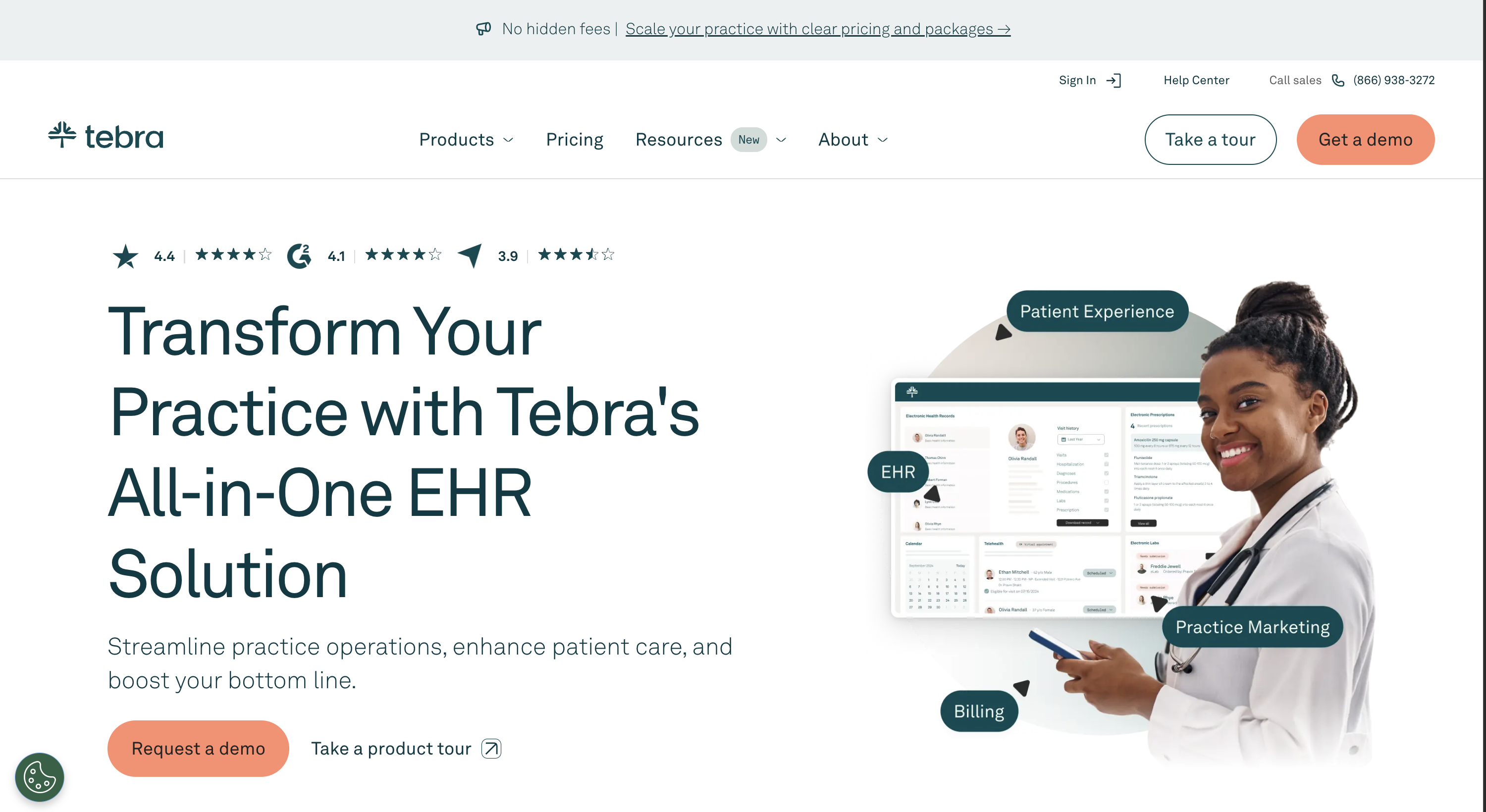
Kareo, now part of Tebra, delivers a patient scheduling solution tailored to small and mid-sized practices. Its user-friendly design and mobile-friendly features make it ideal for independent clinics seeking to streamline scheduling, billing, and patient communication in one connected platform.
Top Features:
- Patient self-booking portal
- Mobile app for providers and patients
- Billing and EHR integration
Pros:
- Intuitive, easy-to-learn interface
- Great option for small practices
- Affordable entry point
Cons:
- Limited customization options
- Reporting tools could be more advanced
Integrations:
Kareo integrates seamlessly with its own EHR and billing modules, making it an all-in-one practice management solution.
Support:
Support is offered through phone, email, and an online community portal.
Reviews:
G2 rating 4.1/5 for Tebra (previously Kareo + PatientPop), with users praising its affordability and ease of setup.
Pricing:
Quote-based—plan options are listed, but specific pricing requires a custom quote.
5. DrChrono
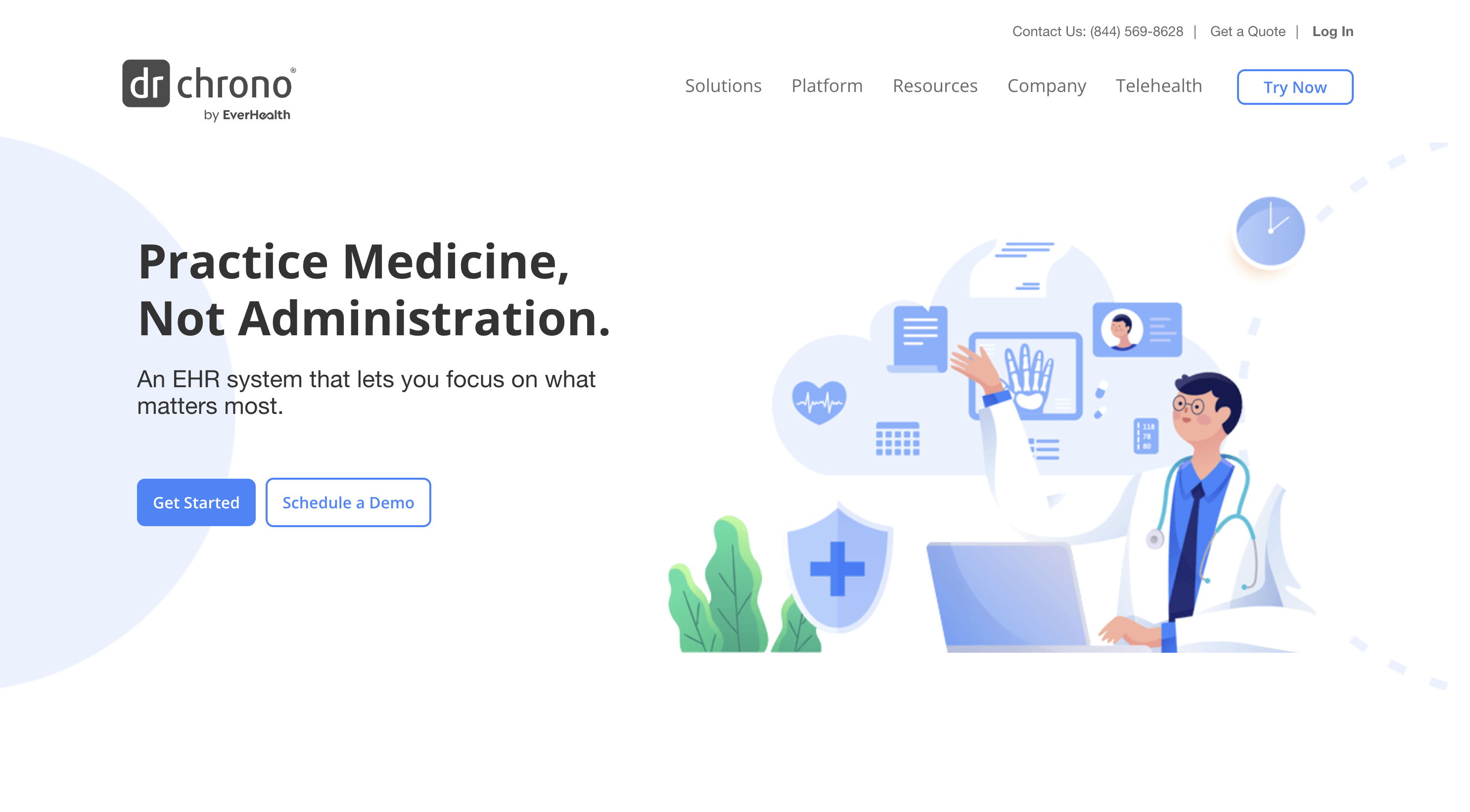
DrChrono is a mobile-first EHR and scheduling platform built for practices that need flexibility and on-the-go management. Known for its strong iPad and iPhone apps, it offers providers and patients a seamless way to schedule, access records, and manage care anywhere.
Top Features:
- Integrated EHR and practice management
- iPad and iPhone mobile apps
- Patient self-scheduling and reminders
Pros:
- Strong mobile-first approach
- All-in-one EHR and scheduling solution
- HIPAA-compliant telehealth included
Cons:
- Can be costly for smaller practices
- Occasional syncing delays with third-party tools
Integrations:
DrChrono integrates directly with EHR, billing, and telehealth, providing a unified ecosystem.
Support:
Support is available through email, phone, and a ticketing system, with priority tiers for premium users.
Reviews:
G2 rating 3.5/5 for DrChrono by EverHealth, praised for its mobile usability and feature set.
Pricing:
Quote-based—official tiers (Prometheus, Hippocrates, Apollo, Apollo Plus) are listed, but pricing is only available upon request.
What Features to Look for When Choosing the Best Physician Scheduling Software?
Selecting the best physician scheduling software involves evaluating several key features that support efficiency, flexible scheduling, and compliance.
1. Multi-Provider and Multi-Location Support
Users should look for scheduling platforms that support multiple providers and multiple practice locations from a centralized dashboard.
This feature is essential for large practices, hospitals, or health systems that need to coordinate appointments across different departments or locations.
It simplifies oversight and reduces the risk of double-booking or miscommunication.
2. Automated Scheduling and Shift Management
Automated schedule generation helps save time and reduce human error in managing complex calendars.
Look for tools that offer rules-based automation, which can take into account provider preferences, on-call shifts, required rotations, and specialty-based scheduling.
This streamlines staffing processes and ensures adequate coverage at all times.
3. Mobile Access and Notifications
Top scheduling systems provide mobile apps or browser-based portals that let healthcare providers view, update, and manage their schedules on the go.
Real-time alerts and push notifications ensure that providers are immediately informed of any schedule changes, cancellations, or urgent bookings.
This enhances flexibility and responsiveness in dynamic clinical environments.
4. Integration With EMR/EHR Systems
Seamless integration with electronic medical records (EMR) or electronic health records (EHR) systems enhances workflow efficiency.
When scheduling software syncs directly with patient records, it eliminates the need for duplicate data entry and ensures that all relevant patient information is easily accessible during appointments.
This integration also supports more accurate documentation and billing.
5. HIPAA Compliance and Security
Because scheduling software handles sensitive patient data, strong data protection is crucial.
The platform must include secure login credentials, access controls, data encryption, and full compliance with HIPAA and other relevant healthcare privacy regulations.
Ensuring patient confidentiality builds trust and helps avoid legal risks.
6. Reporting and Analytics
Robust analytics features enable administrators to track key metrics, including provider productivity, time-off balances, appointment fill rates, and no-show trends.
Custom reports provide valuable insights that support more informed staffing and operational decisions.
This helps optimize resource utilization and improve overall efficiency.
7. User-Friendly Interface
A clean, intuitive interface makes it easier for physicians, nurses, and administrative staff to learn and use the system efficiently.
An easy-to-navigate dashboard reduces training time, minimizes data entry errors, and ensures that scheduling tasks can be completed quickly and accurately.
This usability contributes to smoother daily operations and better staff satisfaction.
Which of the Top Patient Booking Systems Is Right for Your Business?
When evaluating patient booking systems, it's important to consider the specific needs of your practice.
Features like real-time calendar integration, self-service scheduling, and multi-provider support can make a significant difference.
The key factors to consider are:
- Calendar Integration: Syncing with existing calendars helps prevent double-booking and scheduling errors.
- Self-Scheduling: Allowing patients to book, reschedule, or cancel their own appointments increases convenience and reduces administrative workload.
- Multi-Location Support: Practices with multiple locations require a platform that manages all sites from a single interface.
Selecting the right system depends on the practice size and its specific requirements.
Solo practices may prioritize ease of use, while larger clinics often look for robust reporting and multi-provider features.
Some patient booking systems also offer analytics and performance tracking. This gives practices insight into appointment trends and no-show rates.
Unlock 300+ integrations with no hidden fees, bespoke rewards, and dedicated support
Related Articles











